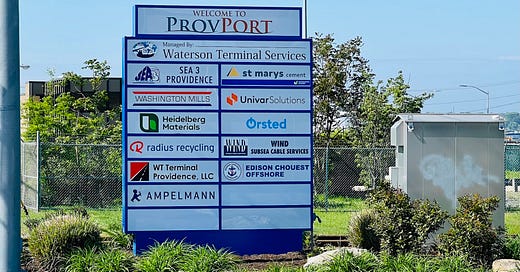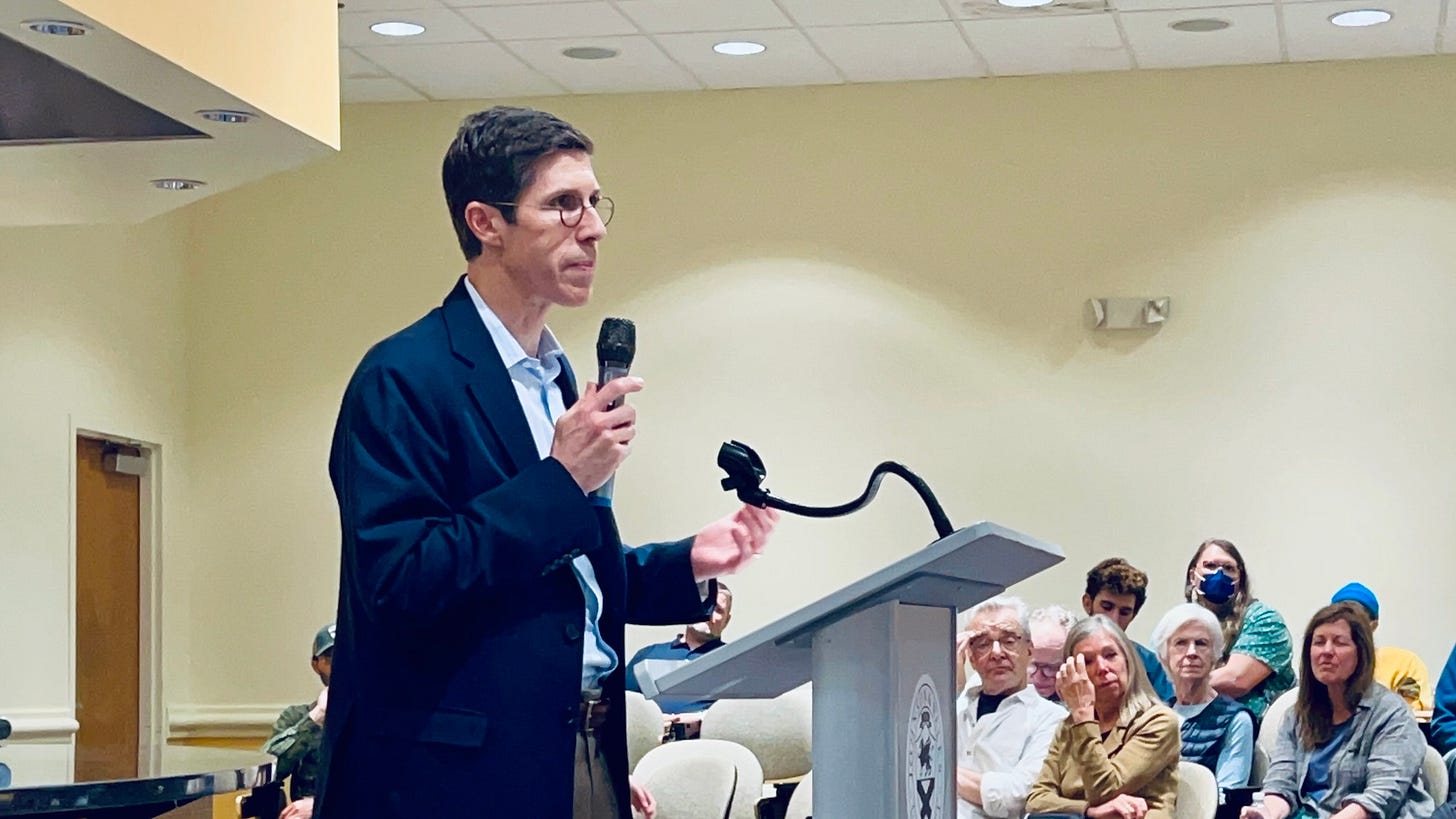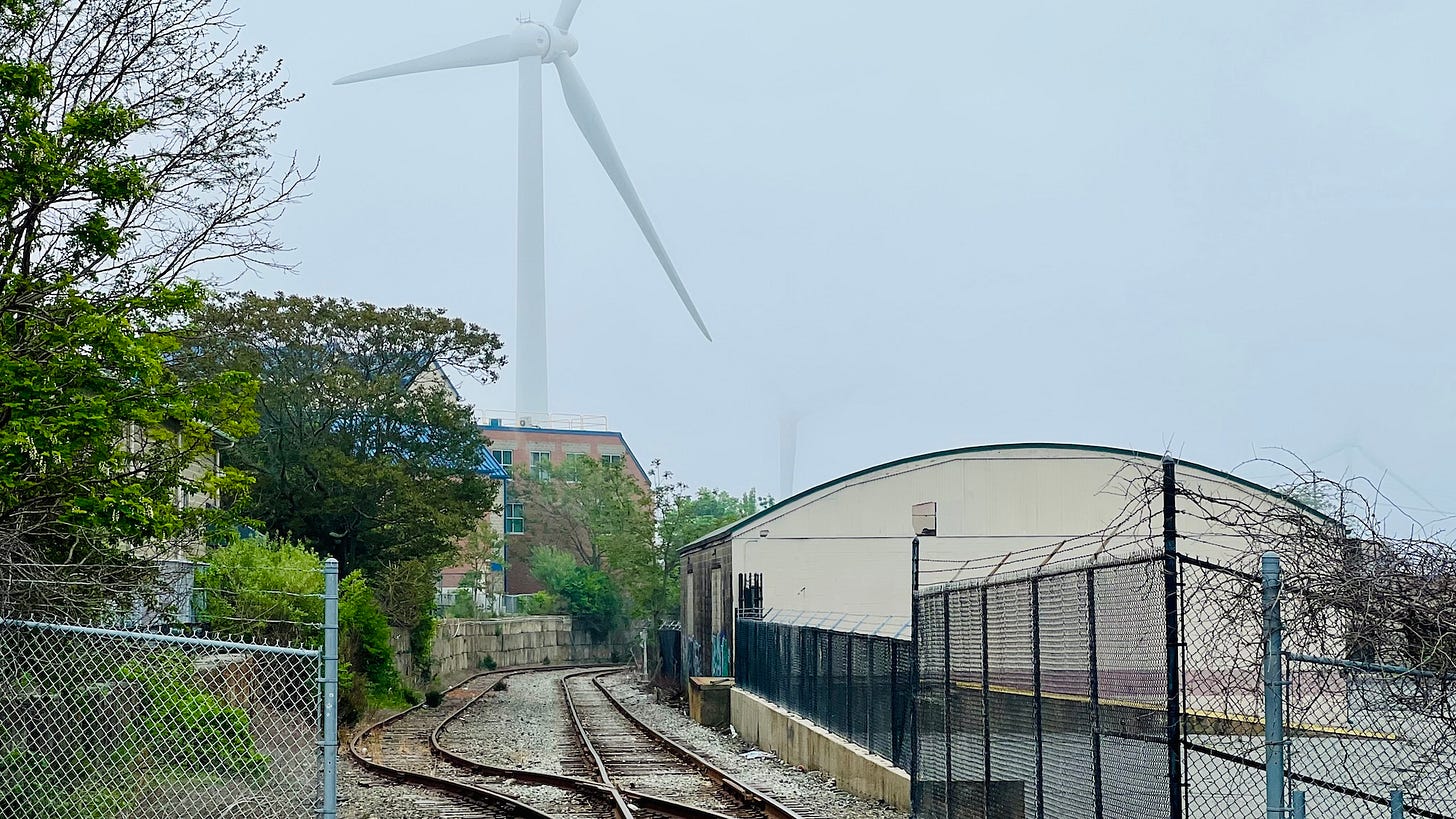When "robust community engagement" trickles down from those in power
"You talk about community engagement and feel so good about our community engagement when no real, substantial, meaningful change has happened..."
Saturday was Providence Port Day. It began with bus tours of ProvPort with the management company Waterson Terminal Services, a trip 300 feet underground with the Narragansett Bay Commission, tours of Collier Park, and an introduction to the public access points people can use to get to the ocean in Providence. After lunch, there were opportunities to attend three of the 18 workshops, focused on different aspects of the Port’s history and future, including serious discussions about the industry’s health and environmental impacts on the local community.
It was an excellent event, and I hope they hold it again next year.
The Providence Eye organized the event, and sponsors included ProvPort, Waterson Terminal Services, Save The Bay, GZA, Ørsted, the People’s Port Authority, and the City of Providence. There was a lot to process in the eight-hour-long event, and I’ll be using some of it for future pieces, but this being primarily a political site, I want to write about the comments given by Providence Mayor Brett Smiley, Waterson Terminal Services CEO Christopher Waterson, and a question posed by Ellen Tuzzulo from the People’s Port Authority that gets at the heart of the issues that affect the Port’s ability to be truly responsive to the needs of the community.
Event organizer Deborah Schimberg, founder and publisher of The Providence Eye, introduced the Mayor.
Mayor Smiley noted that everyone in the City of Providence has thoughts, opinions, concerns, and curiosity—but not always information—about the Port of Providence.
“The Port here in Providence is a vital part of our local economy… and millions of tons of cargo come through daily,” said the Mayor. “The Port plays a critical role in our supply chain and contributes to what’s estimated to be $3 billion to the local economy. The Port is a major part of the economic fabric of our city. It is a unique economic asset here in Providence. While we try to balance environmental impact and continue to evolve toward forward-thinking industries, it is critical to the region’s economic growth. It is an asset that can’t be replaced, so we work closely with partners like Waterson Terminal Services and others up and down Allens Avenue to make sure that we are getting the most out of the Port economically, that we’re maximizing employment opportunities, and using it to secure our economic future and our economic position in the region.”
The Mayor quickly reviewed the renewal of the 30-year contract between the city, Waterson, and ProvPort. He also enthused about the growing wind industry in the Port, exemplified by Ørsted, a Danish multinational energy company driving offshore wind development in New England.
“While over the next three years the wind energy business may have a bit of a bumpy ride,” said Mayor Smiley in reference to the Trump Administration’s short-sighted cancellation of wind energy projects, “this is a long-term investment in a long-term growing industry. A term-limited federal administration isn’t going to change that. We may see a bit of a plateau, but we remain optimistic and convinced that the Port of Providence will play a vital role in the wind energy business.”
As part of the renewed 30-year contract, all parties have agreed to create a ProvPort Master Plan. The plan is intended to be a robust community engagement initiative with ample opportunities for community involvement. It will be a long-term planning initiative designed to shape the future growth of ProvPort and the entire waterfront.
“We are looking to balance economic opportunity, environmental stewardship, and the impacts of climate change,” said Mayor Smiley. “One of the things that our planning department is especially good at is community engagement and having ample opportunities for neighbors, residents, and stakeholders to have their voices heard and reflected.
“Our aspiration is that Providence become a model for how a working waterfront can evolve to meet the future needs of the community, remain a source of important jobs and opportunities, remain a vital economic asset, respond to the threats of climate change, and mitigate the downside effects of things like stormwater impact, stormwater runoff, air quality, and the rest,” continued the Mayor.
“Providence has a good history. Our climate justice plan is one of the best in the country, and we think our Port Master Plan can be as well. I look forward to the work, which has begun and will go on over the next year or so. Then, the outcome of it [will be felt] for the next 30 years.”
The Mayor then introduced Christopher Waterson, CEO of Waterson Terminal Services.
“The idea for Port Day started at our initial Master Plan community engagement meeting, where I had a one-on-one conversation with a member of the Washington Park community who said, ‘You know what? Please invite people into the Port and do tours,” said Waterson. “I was like, ‘You know what? You’re probably right. That is a good idea.’ So when Debbie came to me to pitch the crazy idea of a Providence Port Day, I was already primed and ready to say, ‘Yeah, I think that’s a good idea. We received that kind of feedback.’”
Waterson saw this as an example of how community engagement can improve how the Port and the community interact and how that relationship can continue to improve in the long term.
In Waterson’s view, ProvPort is generally tucked away, well off Allen’s Avenue, and not nearly as visible as some other properties referred to as the Port of Providence, where problematic industries such as Sims Metals and Shell Oil have set up shop. This gets to the issue of disambiguating ProvPort and the Port of Providence. Most of the industries along the waterfront, from the Manchester Street Generating Station and Collier Park to the Save The Bay Campus and Johnson and Wales University, are not under the management of ProvPort. “Thirty years ago,” said Waterson, “we missed the branding and made it confusing that ProvPort and the Port of Providence are not the same thing.”
This confusion works for and against ProvPort. Oftentimes, when there’s a Port disaster like a pipeline explosion or a recycled metals fire, it’s not on a property managed by ProvPort. Waterson Terminal Services is not responsible for whatever mismanagement may have contributed to the emergency, but people in the neighborhood breathing the toxic pollution have no clear way of knowing what particulates and chemicals are coming from what industries. To them, it’s a toxic mix of asthma-inducing airborne filth. Waterson Terminal Services and ProvPort are often blamed for all problems in the Port, which is inaccurate, but the setup allows the company to reasonably deny responsibility for many of the problems residents around the Port endure.
“We periodically hear that the Port of Providence is underutilized, and while that may be true of some of the properties along Allens Avenue, I think everyone who attended the bus tour today can see that that’s not true of ProvPort,” said Waterson. “ProvPort is a 140-acre facility that is highly utilized and bustling with activity. As you saw this morning, ProvPort’s list of tenants continues to grow, particularly with companies supporting the construction and maintenance of offshore wind in the Northeast, like you saw with Wind Cable Services and Ørsted. Over the last year, over 450 vessels called ProvPort, which is more than triple what it was about three years ago, and most of that vessel growth is due to servicing offshore wind.
“There’s an economic analysis that will be attached to the ProvPort Master Plan,” continued Waterson. “It’s not ready for prime time yet, but you get a sneak preview: The study concluded that ProvPort supports over 2000 jobs in Providence, direct and indirect, and 3000 statewide. That has generated nearly $300 million in earnings and well over a billion dollars in sales across the state.
“More directly, ProvPort’s revenue sharing agreement with the city generated more than $1.3 million last year, including $150,000 into each of the newly formed community benefit and sustainability funds that will directly impact Wards 10 and 11 from now and for the entire 30-year life of the agreement.”
Waterson noted the changes he’s seen in the Port over the last two decades. “Millions of tons of coal used to be imported here,” said Waterson. “That business is completely gone and replaced with cleaner cargo such as the lumber, automobiles, and offshore wind components you saw today. We handle critical cargoes, such as cement, that are used to improve our roads and bridges, and road salt that keeps our roads safe and ice-free in the winter. Additionally, the legacy fossil fuel tenants that support home heating during the winter months are actively working to transition to renewable fuels.
“While the cargoes are getting cleaner, we’re also cleaning up Port operations. We are one of only three New England port facilities to receive our Green Marine certification, a program that mandates continuous environmental improvement. While these changes may seem slow, they are happening. And when our Master Plan is published later this year, it will set the course for the next 30 years of change.”
The idea of “robust community engagement” was brought up by both Waterson and the Mayor, but there is still a question of what that looks like. Despite the appearance of collaboration between the community, the Smiley Administration (acting through the planning department), and ProvPort management, the power in these meetings trickles down, and the community is involved in a limited way. For instance, ProvPort determines the scheduling of the community engagement meetings (with possible input from the administration). Waterson told those listening that if they sign up on the Port Master Plan website, they will be kept up to date on the schedule going forward. To what extent is the community involved in scheduling or conducting the meetings?
I fear that the Port Master Plan process will proceed like the Comprehensive Plan did. In October of last year, the Providence City Council settled on a comprehensive plan draft that was nothing short of visionary and historic. A week later, that plan was eviscerated by lobbyists, lawyers, and Mayor Smiley’s promised veto. The plan that passed, while an improvement over past plans, was a keen disappointment.
Ellen Tuzzulo, from the People’s Port Authority, asked a question after Waterson finished his comments.
“I’m from the People’s Port Authority,” said Tuzzulo. “We are an organization led by people from the South Side and Washington Park who are concerned about the health impacts on our children, neighbors, and laborers in the Port. We’re concerned because we’ve been advocating for 10 years and feel like we have not seen meaningful change happen…
“The mayor talked about community engagement. Our feeling is that often we get engaged when there’s an explosion or a fire. We come, bare our souls, and talk about our children, or we talk about spending nights in the ER with asthma attacks, and then nothing happens.
“What are the chemicals in the Port? What are we breathing? When you drive down Allen’s Avenue or the highway, you have that terrible smell - I know you’ll say that’s not ProvPort - but we experience that as a cumulative health impact. You smell it if you live in the South Side or Washington Park. I’m not an expert in all the crap we’re breathing in - but Julian Drix is and can tell you a lot more about that.
“What we’ve been asking for and demanding through the Port Master Planning process is that there be two community representatives on the ProvPort board, a nonprofit organization. Can you commit to putting two community members on the Board of ProvPort who are not appointed by the mayor? Not political, business, or labor interests, but community members who have spent the night in Rhode Island Hospital with their children having asthma attacks, have chronic immunodiseases, or heart disease caused by living in a place with all of this pollution. Can you commit to that?
“And if you can’t, can you tell us why not? You say ‘community engagement,’ and ‘we care about the residents of Providence,’ but I don’t understand how you can say that. You feel so good about our community engagement when no real, substantial, meaningful change has happened to make the Port safer or reduce the cumulative health impact on our neighbors, the hospitals, health centers, and schools.”
“I understand and share your concerns,” said Waterson. “We’ve done this a lot. We’ve been talking to folks like Julian Drix, Monica Huertas, and you for a long time. We are going through the master plan process that I described. The master plan process is in response to this type of feedback, working with the city and community. The master plan is not done yet, so I can’t commit to anything related to a master plan that is not yet finished.”
The conversation seemed to annoy an older man in the audience. “Chris?” said the man, “Let’s get back on track.”
The presentations from Mayor Smiley and Waterson were now running over time, and there were still three hours of workshops ahead. The meeting came to an end with no promises being made.
“All I’ll say is stay engaged,” said Waterson. “We’re going through a process. I’m not committing one way or the other; I’m saying to stay engaged. We’re going through the process, and I think there will be continued engagement. We are hearing the concerns and doing our best to mitigate those where possible. That’s what I can say, and I appreciate you standing up and speaking.”
Here’s the video:







Thanks, Steve. Important information. Hopefully there will be real changes in the near future. Currently people worry about the effects of cuts on the federal level affecting the health of RI people, especially children, when many longstanding fixable problems continue to happen in our own back yard.
What is so interesting about the Port of Providence and Prov port is that while we import lots of stuff, the exports are primarily scrap metal and junk cars. In other words we produce NOTHING to export. You cannot blame Prov port for that, that is on the mayor and the governor and CommerceRI in that they have done nothing to reverse the destruction of manufacturing in RI. And are unlikely to do so. Certainly a global trend to dismantle manufacturing in the industrial countries, so maybe we have to stop calling them that, and it reminds us the Trump tariff policy, supposedly to return manufactuiring to the US, is going to be a complete failure. But Trump is too stupid to figure that out and the supposedly smart guys in RI are also clueless.